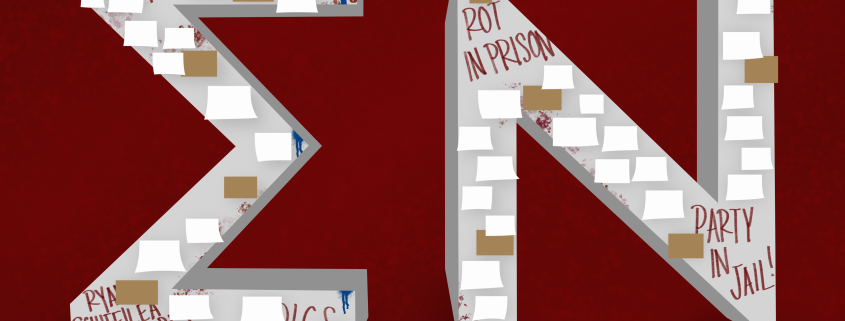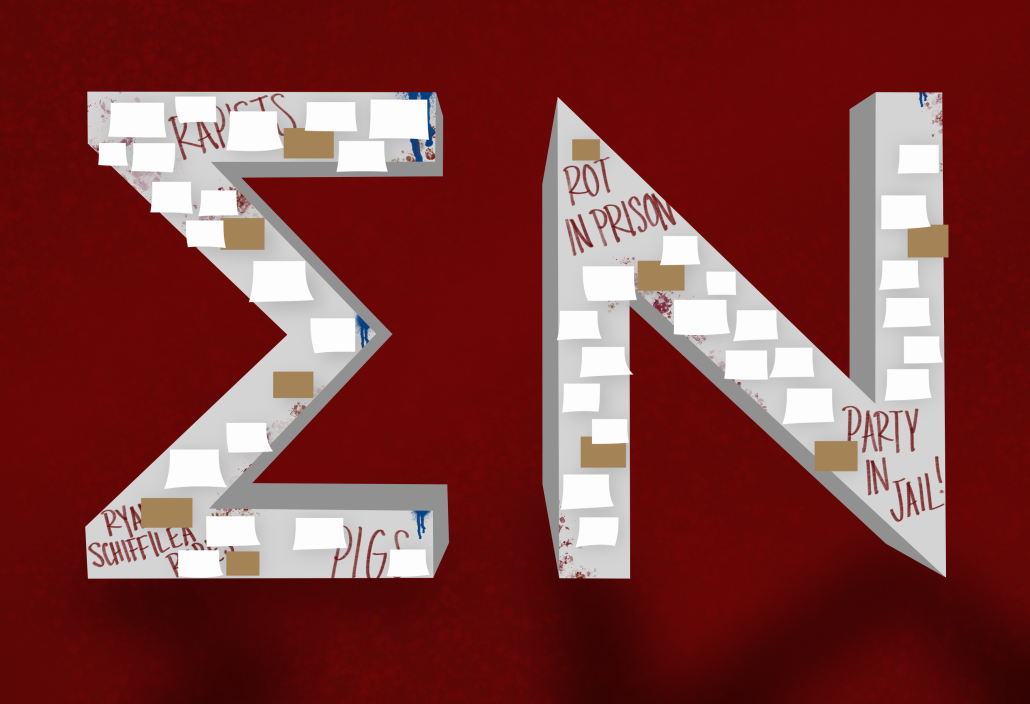The Daily Trojan Editorial Board calls for USC to abolish Interfraternity Council
Content Warning: The following article contains references to sexual assault, drugging and violence.
The Daily Trojan Editorial Board unequivocally believes, uplifts and stands with sexual assault survivors and anyone who has encountered harm under patriarchal systems of oppression.
On Wednesday, the Department of Public Safety announced in a communitywide memo that the Sigma Nu fraternity house had been placed on an interim suspension following drugging and sexual assault reports. The memo came with “safety tips” that “may help reduce the possibility of experiencing a crime,” such as keeping track of drinks and traveling in small groups, which only further bolsters a false method of deterrence that shifts responsibility away from perpetrators.
To “help reduce the possibility” of sexual violence, the answer is, undoubtedly, straightforward: Don’t rape.
But, as evidenced by the continuation of reports that DPS received since Oct. 20 regarding more allegations of drugging and sexual assault at other fraternity houses on the Row, and confirmation from the Los Angeles Police Department that former Sigma Nu president Ryan Schiffilea is a “main suspect” in the Sigma Nu sexual assault reports, it is clear that members of Interfraternity Council-affiliated Greek life chapters cannot grasp this clear rule.
Following these reports, students have protested outside the Sigma Nu house since last Thursday, leaving signs taped on walls with messages such as “Abolish Greek Life,” “Male chauvinists go to hell” and “Was inflicting a lifetime of trauma worth it for you?”
While the last question was addressed to Sigma Nu — the Daily Trojan Editorial Board would like to extend it to the University administration as well. After a massive emergence of reports and student demands, the University must acknowledge the situation with a firm stance — a definitive position — instead of shallow community letters that say nothing and mean nothing without action.
Unfortunately, the manner in which USC responded to the string of drugging and sexual assaults is nothing new — USC administrators knew of former gynecologist George Tyndall sexually abusing patients yet they did not fire him. Whenever a critical issue arises, the University adopts a half-hearted, performative and optical approach, which feigns concern for social issues and curbs media attention.
Such performativity was the case with Black Lives Matter protests last year. Following the murders of George Floyd, Breonna Taylor and Ahmaud Arbery, President Carol Folt released a statement declaring,“This moment is our call to action,” yet merely added fancy titles onto an already burgeoning University and changed the name of a building. Folt did not even attend the Black Lives Matter march on USC’s own campus.
Let us not forget USC failed to even acknowledge the demands of USC Students for Justice in Palestine, who raised legitimate concerns about the anti-Arab and anti-Palestinian rhetoric from Undergraduate Student Government leaders, former senators Isabel Washington and Nathaniel Manor. The University has a track record of picking and choosing which causes to pledge support; but, even when it promises support, USC rarely follows through.
Now, USC is approaching the Sigma Nu assaults in the same way it approached Black Lives Matter and Palestinian students’ concerns last year. Just like its handling of the latter events, the University is chalking up statements promising it will do better, yet discreetly praying that its complicity in IFC’s history of sexual violence goes unnoticed.
For example, while DPS sent out another memo Saturday that clarified, “No action or inaction by a sexual assault survivor makes that person responsible for another person’s abusive or criminal conduct,” USC’s lackluster response and Folt’s message to the University speaks volumes to its history of inaction toward situations that compromise its students’ safety.
Time and time again, the University shows that it is, at most, interested in surface-level changes but not institutional shakedowns.
The sexual assault cases at Sigma Nu are not random occurrences but instead the amalgamation of fraternities’ unbalanced systems of power. Indeed, DPS receives reports about sexual assault in other fraternities, as evidenced in Saturday’s memo.
Fraternities are dangerous institutions that reinforce harmful behavior toward women, nonbinary individuals and people of color. These institutions are places where racism, sexism, homophobia and classism flourish. For example, the National Panhellenic Council banned alcohol in 1975, yet fraternities can still distribute it. This sexist rule makes sororities rely on fraternities for events and alcohol, which gives fraternities control over how women consume alcohol.
Greek life has been a part of USC since 1889 — decades before the school would see its first Black graduate. Purposefully founded to serve white, heterosexual, cisgender men, fraternities have not changed much over the years. Despite scholarship and fundraising opportunities, membership barriers, such as high costs, still ensure that low-income students, who are predominantly Black and Indigenous people and people of color, cannot join.
The white demographic buildup enables racist behavior to go unchecked, and, with most members being cisgender men, sexism is the norm. Greek life manifests not only patriarchy but also a cesspool of bigotry, where every member must live up to being a white, cisgender man. This standard creates a culture of men who are complicit in sexual assault and remain silent when their “brothers” wreak harm against women.
Despite IFC’s corrosive patriarchal culture, USC has a history of letting fraternities get away with violations. While the school strictly enforces coronavirus regulations for on-campus dorms, these fraternities have practically no rules — throughout the pandemic, they held parties with no social distancing and faced no disciplinary action from the University. While USC explicitly prohibits hazing, fraternities still engage in it.
When it comes to actually enforcing meaningful regulations, especially against IFC fraternities, the University falls short. This inaction may be attributed to the monetary and social benefits fraternities provide. Fraternity members are often so loyal to the school that their alumni donate generous amounts to USC. In fact, some Board of Trustees members, such as Chairman Rick Caruso, were members of fraternities when they attended USC, which could also contribute to USC’s lack of action toward fraternities.
Among the lack of accountability and complacency, students are ultimately tired of a University that protects rapists instead of its students. Folt and USC administration: We see you, but we hear your silence. While Sigma Nu’s actions horrify our community, this incident is only one of the countless times IFC has endangered USC students and the surrounding South Central community. Your failure to enact tangible change continues to make you complicit in the same violence and misogyny that IFC perpetuates.
As the Daily Trojan Editorial Board, we demand the University address its role in allowing the events at Sigma Nu to occur. As evidenced by past and emerging incidents of sexual assault at IFC fraternities, Sigma Nu is only one part of an entire institution that perpetrates sexual violence. To prevent such horrific instances in the future, the University must move to dismantle the entire IFC system that upholds this misogynistic framework.
However, we acknowledge the University’s track record of prioritizing profits over students’ well-being and making optical promises to save face. Beyond asking students to keep their drinks with them at all times, the University should actually commit to a systemic change, which would actually prioritize students’ safety over revenue and appeasing donors.
At the bare minimum, Sigma Nu must permanently lose University recognition. USC’s current lackluster stipulations for fraternity members, such as compliance with online consent modules and training videos, only reinforce the idea that sexual assault and drugging are forgivable acts. A line must be drawn somewhere. Let the drawing finally, for once, commence here.
The University administration should not be alone in taking accountability. The relationship between students and Greek life is complex and not exclusive to those who are not sorority or fraternity members. Because USC’s Greek life culture extends to every student, everyone is complicit in the continuation of this institution on our campus.
To those in Greek life: Although your organizations often promote community, service and other values important to USC, do these values outweigh explicit contempt with rape culture and misogyny? Does having a community also include staying quiet when fellow Greek members drug and sexually assault people? Does service include giving money to an institution that protects rapists? Is this a reputation you want to uphold?
To those not directly in Greek life: Does a party matter more than protecting a person’s body? Even if you don’t actively seek social activities in Greek life, its institution occupies the campus and community’s space. Its existence here affects the reputation of you and USC. People see what is happening, and they see you. They see whether you act or stay quiet.
To address the problems that go beyond Sigma Nu, we must reflect on our own relationships with Greek life and question whether these organizations’ social benefits outweigh the harm they cause.
Ultimately, students must all stand behind this call for accountability. We must demand justice for the individuals who were harmed, both the reported ones and those who have yet to step forward.
Students must come together and pressure the University and authorities to charge the responsible parties and permanently end this culture of rape and privilege. Again, this is not possible by just suspending Sigma Nu because Greek life, as an institution, has deeply ingrained problems.
Community, service and honor can be possible outside of an institutionalized Greek life. As it stands, these values do not exist in a Greek system of injustice.
If you are in need of support, here are some resources you can contact.
USC Relationship and Sexual Violence Prevention and Services: Located at Engemann Student Health Center Suite 356. Individuals can call (213)-740-9355 and request to speak with an advocate or counselor. Services are confidential.
Rape, Abuse & Incest National Network (RAINN): A free, confidential hotline that is active 24/7. Individuals can call (800)-656-4673.
Daily Trojan Fall 2021 Editorial Board


